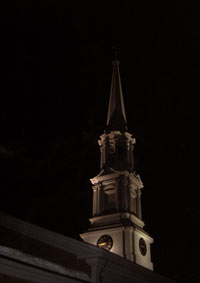"Believers and Nonbelievers" by Rev. Tom Schade
 Memo from October 24, 2006
Memo from October 24, 2006Last week, I went with a group of my colleagues to Rowe Camp and Conference Center for a study group for UU ministers. We gathered to review some of the findings of some of those studying the human brain, and to consider the implications that they have for organized religion. There is a field of study now known as “Neurotheology”, which inquires into how religious feelings and spirituality is processed by the brain. So we read some of the writings that have come from the scientists, and fell to the task of trying to sort out what it means for understanding the religious diversity in the world, and planning worship services, and the rest of our work.
I don’t think that we pushed back the frontiers of human knowledge. After all, most of us don’t have much of a background in medical science. I myself never advance beyond the “gee whiz” level of reaction to this kind of information. Someone tells me that there are some gazillion neurons in the brain, each making another gazillion connections to each other. Each of these gazillion neurons is programmed by genes that make up its DNA, and scientists think this gene causes the neurons to act in this way, and that gene tunes that other neuron to music of the spheres. To which I respond, “Gee Whiz! Isn’t that something? Wow!”
Of course, I believe it. I have no reason not to.
They could show me a picture of some squiggly little things, and tell me that if they turn clockwise, it that causes Methodism, while the counter clockwise movement results in Sikhism, and I would believe them. I just wouldn’t take it very seriously.
There is a serious scientific consensus that there are identifiable brain states, or patterns of brain activity, that correspond with what people experience as a “spiritual feeling.” Some analysts call that feeling “self-transcendence.”
There is something going on when people have that feeling of connection to a larger, all-encompassing wholeness. Further, there is not much difference in these brain reactions between the Buddhist, the Christian or the Natural Mystic. There is a brain process that one might call “spiritual awareness” and it is independent of any specific religious content.
In other words, there may be a scientific basis for the distinction that so many people make between “being spiritual” and “being religious.”
Even more interesting is the evidence that some people, due to their unique brain, are more prone to this feeling of self-transcendence than others. Some people seem to be more hardwired for spirituality, and most likely, religion than others. We may not get to choose these aspects of life, anymore than we choose whether we are right-handed or left-handed.
Do they mean to tell me that all those arguments about the existence of God are not likely to change anyone’s mind? If so, I am glad to find that out, since that has been my impression all along. There are those who believe and those who don’t. No less an observer of the religious spirit than St. Paul remarked that the degree of our faith was a gift from God, and not our own doing.
Another bit of information from the brain scientists clarifies this more. It appears that when we learn a piece of information, we remember not only it, but also any emotions we may be feeling while we are storing that knowledge away. If you were scared when you learned about religion, that fear will always re-surface to some degree whenever you think about religion. It only makes sense.
So what does all this mean?
I think that what it means is that whenever people gather together to have a church service, it is inevitable that everyone in the room will have their own unique angle of vision on what the group is doing. Some will be fully caught up in it; others more skeptical; and still others, quite anxious and nervous. And, most of those emotional reactions will not be under the rational control of the people in the pews.
Given that, doesn’t it take bravery to worship together? All sorts of people, in widely varying emotional states, come together to make a human connection with each other, in the presence of as much transcendence as they can countenance, and to be witnesses to each other’s struggle to live in the fullness of the truth.
There is great joy there, because while we each have our own brains, we share a heart.
Tom


0 Comments:
Post a Comment
<< Home